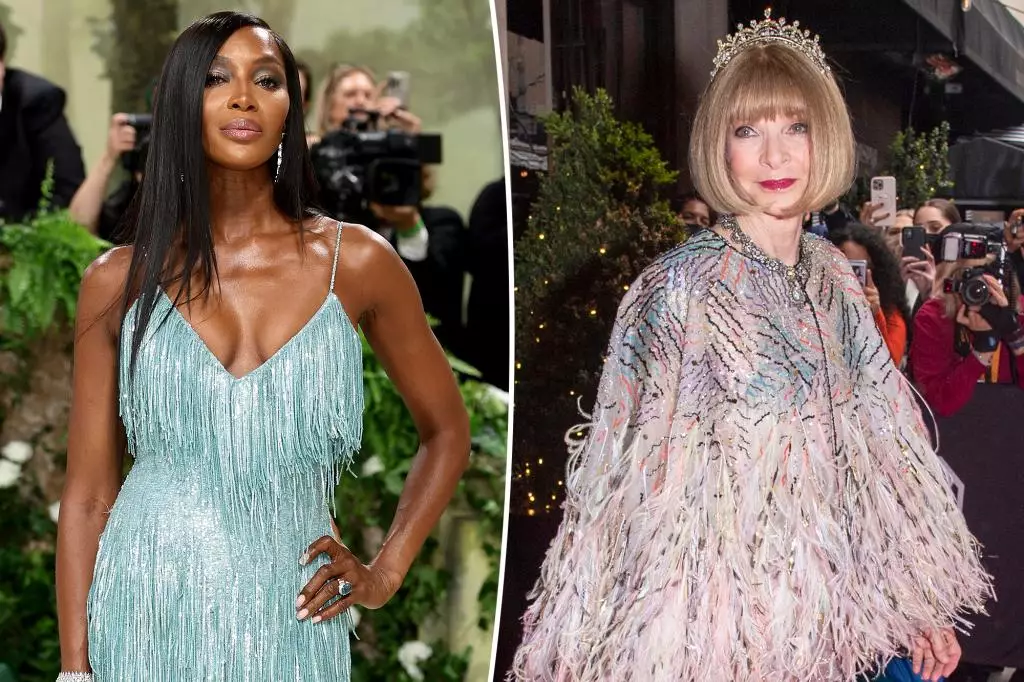Naomi Campbell’s announcement about skipping the 2025 Met Gala has raised eyebrows and ignited discussions about the undercurrents shaping the fashion world. The Met Gala, often referred to as the Super Bowl of fashion, is not merely an extravagant celebration of style; it represents the intersection of culture, creativity, and social discourse. Campbell’s decision signals a potential schism in the typically glamorous narrative associated with the event. Is it just an individual choice, or does it reflect a broader commentary about the dynamics of power and recognition within the fashion industry?
The supermodel’s Instagram post conveyed her admiration for the event’s theme, “Superfine: Tailoring Black Style.” In her words, the theme embodies “how Black dandyism has shaped fashion.” This recognition is crucial, yet her absence echoes the complexities of her relationship with Anna Wintour, the gatekeeper of Vogue and a formidable presence in fashion. Could Campbell’s choice to skip the event be symbolic of a larger fight for agency and acknowledgment in spaces where Black contributions have often been sidelined?
Unearthing the Tension
The backdrop of Campbell’s absence underscores her rocky interactions with Wintour. Their recent public exchanges have not been devoid of tension. During a recent event, Wintour made a pointed remark mentioning Campbell’s tardiness, hinting at a sense of disapproval that many in the audience could feel. Campbell’s witty yet subtly assertive response showed her unwillingness to be a mere subject of criticism. It’s a dance known well within elite circles, where slight misunderstandings can spiral into public spectacle, highlighting the fragile fabric of relationships that the industry weaves.
Yet, Campbell’s critiques come wrapped in layers of respect and admiration for Wintour’s past influence on her career. This duality reveals a complex narrative—while she acknowledges the foundation Wintour laid for her rise in a predominantly white industry, Campbell simultaneously asserts her individuality and the importance of her legacy, forging a path for other Black models and designers who follow. Her choice to honor the legacy of the late André Leon Talley—another icon of Black fashion—further emphasizes the duality present in her relationship with this exclusive event.
The Legacy of Black Fashion
Campbell’s regard for the “Superfine: Tailoring Black Style” theme hints at a much-needed celebration of Black artistry in fashion—an area that has often faced neglect. The historical contributions of Black designers and models to fashion are immense, yet they frequently remain unsung. There’s an urgency for the industry to acknowledge and honor these influences while promoting inclusivity on all levels, from high-fashion runways to editorial spreads.
Her pivot towards a theme that celebrates Black dandyism points to a vibrant culture rich with history and innovation. By highlighting the dichotomy between African and European fashion traditions, Campbell encourages a dialogue that transcends mere aesthetics. It asks us to consider who gets to tell their story, who shapes the narratives, and who ultimately gets recognized in mainstream platforms.
Beyond the Gala: A Call for Authenticity
As Campbell steps away from the Met Gala spotlight, her absence invites an opportunity for deeper introspection about the nature of visibility and the frameworks that govern forums like the Met Gala. The glitzy facade of events and the personalities that adorn them can sometimes overshadow more pressing issues. Campbell’s advocacy for recognition of Black contributions in fashion can incite a broader movement for storytellers to claim their narratives rather than waiting for validation from traditional systems.
As outsiders look into the world of fashion through the tapestry of events like the Met Gala, it is prudent to challenge the status quo. Campbell’s legacy is that of a trailblazer who effortlessly merged the worlds of fierce runway appearances with unapologetic truth-telling. By using her platform to address and honor the nuances within the fashion dialogue, there’s potential for transformation—even if it comes through moments of absence.
Choosing not to attend is not merely a cancellation; it is a statement that resonates beyond the confines of the event. It reverberates through the halls of fashion history, demanding that the industry not only evolves but truly reflects the diversity and complexity of the artistic voices shaping its ongoing narrative.

